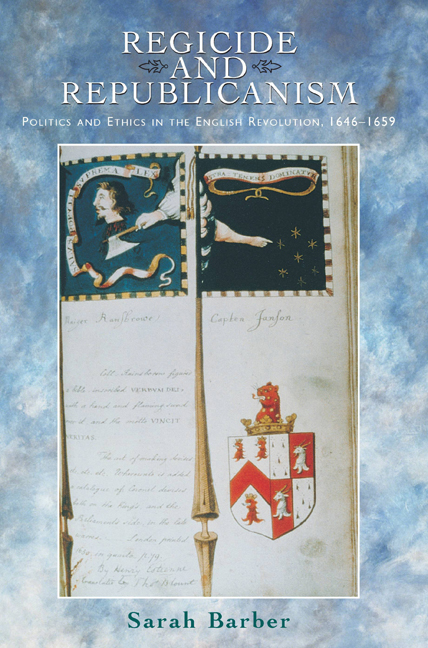Book contents
- Frontmatter
- Contents
- Preface
- List of Abbreviations
- Introduction: Regicide and Republicanism
- 1 Unparliamentary Language and the Dignity of the Crown
- 2 ‘A Mere Man’: Charles Levelled
- 3 The Expense of Blood and Treasure
- 4 King Ahab
- 5 Queen Justice
- 6 Government New Modelled?
- 7 The Engagement of Loyalty
- 8 The Active and the Passive Life
- Epilogue: The Good Old Cause
- Select Bibliography of Printed Sources
- Index
2 - ‘A Mere Man’: Charles Levelled
Published online by Cambridge University Press: 03 October 2020
- Frontmatter
- Contents
- Preface
- List of Abbreviations
- Introduction: Regicide and Republicanism
- 1 Unparliamentary Language and the Dignity of the Crown
- 2 ‘A Mere Man’: Charles Levelled
- 3 The Expense of Blood and Treasure
- 4 King Ahab
- 5 Queen Justice
- 6 Government New Modelled?
- 7 The Engagement of Loyalty
- 8 The Active and the Passive Life
- Epilogue: The Good Old Cause
- Select Bibliography of Printed Sources
- Index
Summary
In Chapter 1 we followed the political action taken by a small number of radical MPs in the Commons which developed into a critique of monarchy. Each leap by which one point was established and the next developed was not always logically consequent, but could be made to sound like a rational progression, and at each point an element in its justification was that the next step was made necessary by the oppressive, arbitrary and tyrannical actions of opponents. A parallel process was discernable within extra-parliamentary political agitation, and the progress of these arguments is here traced within the texts of Leveller writings and the practical agency of Levellers within the New Model Army.
The chapter describes the activities of a group which Austin Woolrych called the ‘populist faction’ — a term full of resonance, since it describes both an agenda and the means of securing it. Several themes, both tactical and ideological, recur. Within the Commons, the army and outside, a small minority harried, embarrassed and chided the majority, leaping over the majority position by claiming to represent the people as a whole. They presented themselves as the champions of the people, whose voice the establishment tried to stifle. The parliamentary campaign was about freedom to speak out in response to particular political issues: the Leveller campaign concentrated on the freedom to disseminate ideas using the vehicle of pamphlet and broadsheet literature. Individuals expressed ideas which the majority censored because it believed them to be extreme. The attempt to silence them was used by the radicals as further evidence that court, church, parliament or army was muffling the voice of the people. At first, the Levellers used the presses to circulate ideas and publicise their campaigns. Later, civilians discovered issues of common cause with rank-and-file soldiers and channelled their grievances through the command structure of the New Model Army. The officers, or grandees, denounced the populists ‘as a form’d and setled partie distinct and divided from others’.
That the construction of the critique of monarchy followed a similar path is illustrated in the Leveller tract, Vox Plebis. Writing at the end of1646, the author of Vox Plebis took advantage of parliament being in session - ‘during which time the Presse ought to be free and open’ — to express an opinion about the structure of revolution.
- Type
- Chapter
- Information
- Regicide and RepublicanismPolitics and Ethics in the English Revolution, 1646–1659, pp. 40 - 65Publisher: Edinburgh University PressPrint publication year: 2020

